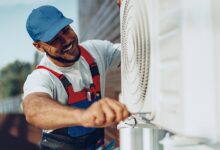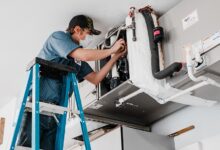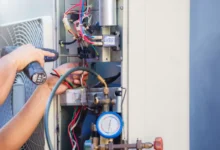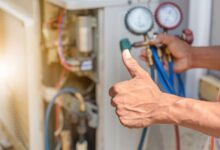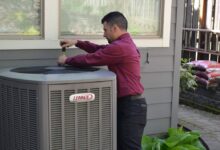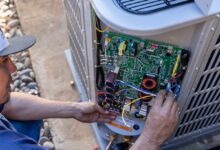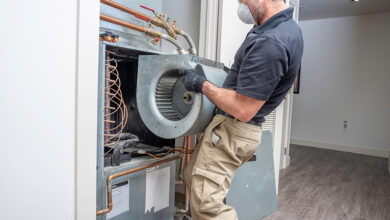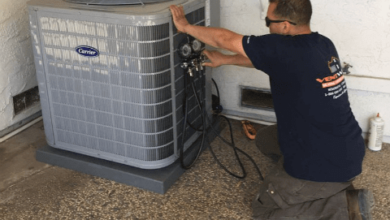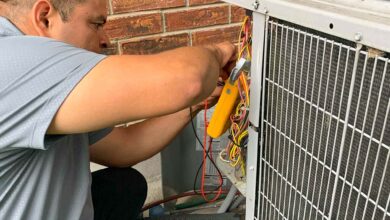Greenville HVAC Repair: Finding the Right HVAC Repair Company
Greenville HVAC Repair – Are you struggling with a malfunctioning HVAC system in Greenville? The discomfort of a broken heater or air conditioner can be unbearable, especially during extreme weather conditions. You need not worry anymore, as we have got you covered! In this comprehensive blog article, we will delve into the world of HVAC repair in Greenville. From understanding the common issues to finding the best professionals in the area, we have all the information you need to restore comfort to your home or business.
Whether you are a homeowner or a business owner in Greenville, HVAC repair is a crucial aspect of maintaining a comfortable indoor environment. From faulty thermostats to clogged filters, there can be numerous reasons why your HVAC system is not functioning optimally. In this article, we will explore the most common issues faced by Greenville residents and provide you with expert tips and insights for a successful repair process. So, let’s dive in and discover how you can get your HVAC system up and running efficiently again!
Understanding the Importance of Regular HVAC Maintenance
Regular maintenance is the key to avoiding HVAC breakdowns. By properly maintaining your system, you can extend its lifespan and ensure optimal performance. Neglecting maintenance can lead to costly repairs and decreased energy efficiency. Here are some reasons why regular HVAC maintenance is essential:
Improved Energy Efficiency
Regular maintenance helps your HVAC system operate at peak efficiency, saving you money on energy bills. When filters are clogged or components are dirty, your system has to work harder to provide the same level of heating or cooling. By cleaning and maintaining your system regularly, you can ensure it operates efficiently, reducing energy consumption.
Enhanced Indoor Air Quality
A well-maintained HVAC system helps improve the air quality in your home or business. Over time, dust, pollen, and other contaminants can accumulate in your system and get circulated throughout your space. Regular maintenance includes cleaning and replacing filters, which helps remove these particles and improves the air you breathe.
Prolonged Lifespan of Equipment
Investing in regular maintenance can significantly extend the lifespan of your HVAC equipment. By identifying and addressing minor issues before they escalate, you can prevent major breakdowns and avoid the need for premature replacements. Regular maintenance ensures that your system runs smoothly and efficiently for years to come.
Prevention of Costly Repairs
Prevention is always more cost-effective than repairs. Regular maintenance allows HVAC technicians to identify potential problems early on and make necessary adjustments or repairs. By addressing these issues promptly, you can prevent them from developing into more significant and costly repairs down the line.
Checklist for DIY Maintenance
While it’s recommended to have professional HVAC technicians perform regular maintenance, there are some tasks you can do yourself to keep your system in good condition. Here’s a checklist for DIY HVAC maintenance:
Clean or Replace Air Filters
Dirty or clogged air filters restrict airflow, reducing the efficiency of your HVAC system. Check your filters regularly and clean or replace them as needed. This simple task can improve the performance of your system and enhance indoor air quality.
Clean Condenser Coils
Outdoor condenser coils can accumulate dirt and debris over time, hindering heat transfer. Use a brush or a vacuum cleaner with a soft brush attachment to clean the coils. This will help maintain the efficiency of your system and prevent overheating.
Clear Debris from Outdoor Unit
Check the area around your outdoor unit and remove any leaves, grass, or other debris that may obstruct airflow. Ensure that there is at least two feet of clearance around the unit to allow proper ventilation.
Inspect and Clean Vents and Registers
Regularly inspect your vents and registers to ensure they are not blocked or obstructed by furniture, rugs, or other objects. Clean them with a vacuum or a damp cloth as needed to remove dust and debris.
Check Thermostat Settings
Verify that your thermostat is set to the desired temperature and functioning correctly. Replace the batteries if needed and consider upgrading to a programmable thermostat for better energy efficiency.
Test and Insulate Ductwork
Inspect your ductwork for any leaks or damage. Seal any gaps or cracks with duct tape or mastic sealant. Additionally, consider insulating your ductwork to prevent energy loss and improve efficiency.
Monitor Refrigerant Levels
If you have a central air conditioner, check the refrigerant levels regularly. Low refrigerant levels can indicate a leak, which should be addressed by a professional HVAC technician.
Keep Outdoor Unit Free of Obstructions
Ensure that your outdoor unit is not obstructed by plants, shrubs, or other objects. Proper airflow is essential for efficient operation.
Schedule Professional Maintenance
While DIY maintenance is beneficial, it’s crucial to schedule professional HVAC maintenance at least once a year. HVAC technicians have the expertise and tools to perform thorough inspections, cleanings, and adjustments to ensure optimal system performance.
Signs Your HVAC System Needs Repair
Is your HVAC system showing signs of distress? Identifying and addressing problems early on is key to preventing further damage and costly repairs. Here are some common indicators that your HVAC system requires immediate attention:
Unusual Noises
If you notice strange noises coming from your HVAC system, such as banging, rattling, or squealing, it’s a clear sign that something is amiss. These noises could indicate loose components, worn-out belts, or motor issues. Ignoring the sounds may lead to more significant problems and potential system failure.
Inconsistent Temperature Control
If you find that some areas of your home or business are significantly warmer or cooler than others, it could be a sign of HVAC system problems. Inconsistent temperature control may indicate issues with ductwork, thermostats, or airflow obstructions. Addressing these problems promptly can restore comfort and prevent energy waste.
Frequent Cycling On and Off
If your HVAC system frequently turns on and off in short intervals, it’s referred to as short cycling. This behavior not only disrupts comfort but also puts strain on the system, reducing its efficiency and potentially causing damage. Short cycling can be caused by various factors, including clogged filters, refrigerant leaks, or faulty thermostats.
Weak Airflow
If you notice weak or insufficient airflow from your vents, it could indicate a problem with your HVAC system. Clogged air filters, blocked ducts, or malfunctioning fans can all contribute to poor airflow. Reduced airflow not only affects comfort but also decreases the efficiency of your system.
Strange Odors
If you detect unusual or unpleasant odors coming from your HVAC system, it’s essential to investigate the source. Musty smells may indicate mold growth, while burning odors could indicate electrical issues. Foul smells should not be ignored, as they can be a sign of potential health hazards or system malfunctions.
Increased Energy Bills
If you notice a sudden spike in your energy bills without a corresponding increase in usage, it may indicate that your HVAC system is not operating efficiently. Inefficient systems consume more energy to provide the desired heating or cooling, resulting in higher utility bills. Prompt repairs can help restore energy efficiency and save you money in the long run.
Tripped Breakers or Blown Fuses
If your HVAC system repeatedly trips breakers or blows fuses, it’s a clear indication of an electrical issue. This could be due to an overload caused by faulty wiring or motor problems. Electrical issues should always be addressed by a professional to ensure safety and prevent further damage.
Leaking or Moisture Accumulation
Leaks or moisture around your HVAC system should not be ignored. Water accumulation can lead to mold growth, damage to your property, and potential system malfunctions. Leaks can be caused by clogged condensate drains, refrigerant leaks, or damaged components. It’s crucial to have a professional inspect your system to identify and fix the source of the leak.
Increased Dust and Allergens
If you notice an increase in dust, allergens, or respiratory issues in your home or business, it may be due to a poorly functioning HVAC system. When filters are clogged or ducts are dirty, contaminants can circulate throughout your space, affecting air quality. Regular maintenance and prompt repairs can help improve indoor air quality and create a healthier environment.
Unresponsive Thermostat
If your thermostat does not respond or does not accurately reflect the temperature in your space, it could indicate a problem with your HVAC system. Faulty thermostats can lead to inconsistent heating or cooling, discomfort, and energy waste. A professional technician can diagnose the issue and recommend the appropriate repairs or replacements.
When to Call a Professional
While DIY troubleshooting may help identify simple issues, it’s important to know when to call a professional HVAC repair service. If you encounter any of the following situations, it’s best to seek professional assistance:
Complex Repairs
If you are unsure about the cause of the HVACissue or if the repairs require specialized knowledge or tools, it’s best to leave it to the professionals. Complex repairs, such as motor replacements or refrigerant leaks, should be handled by experienced HVAC technicians to ensure proper diagnosis and repair.
Safety Concerns
If you suspect any electrical or gas-related issues, it’s crucial to prioritize safety and call a professional immediately. Attempting to fix these issues yourself can be dangerous and may lead to further damage or personal injury. HVAC professionals have the expertise to handle potentially hazardous situations safely.
Manufacturer Warranty
If your HVAC system is still under warranty, it’s essential to follow the manufacturer’s guidelines regarding repairs. Attempting DIY repairs or hiring unqualified technicians may void the warranty. By choosing a professional HVAC repair service, you can ensure that the repairs are performed correctly and in compliance with the warranty’s terms.
Lack of Time or Expertise
If you lack the time, tools, or expertise to troubleshoot or repair your HVAC system, it’s best to seek professional help. HVAC technicians have the necessary training, experience, and equipment to diagnose and resolve issues efficiently. By outsourcing the repairs, you can save time and avoid potential mistakes.
Troubleshooting HVAC Problems
Before calling in the professionals, it’s worth trying to troubleshoot some common HVAC issues yourself. Here are some step-by-step troubleshooting processes for common problems:
Malfunctioning Thermostat
If your thermostat is not functioning correctly, it can affect the overall performance of your HVAC system. Here’s how you can troubleshoot a malfunctioning thermostat:
Step 1: Check the Power
Ensure that your thermostat has power. If it’s battery-operated, replace the batteries. If it’s hardwired, check the circuit breaker to ensure it hasn’t tripped. Reset the breaker if necessary.
Step 2: Verify the Settings
Check the temperature settings on your thermostat. Make sure it’s set to the desired temperature and the mode (cooling or heating) is selected correctly. Adjust the settings if needed.
Step 3: Clean the Thermostat
Dust and debris can accumulate on the thermostat, affecting its functionality. Gently clean the thermostat with a soft cloth or a small brush to remove any dirt or obstructions. Be careful not to damage any delicate components.
Step 4: Calibrate the Thermostat
If your thermostat is not accurately reflecting the temperature in your space, it may need calibration. Consult the manufacturer’s instructions for your specific thermostat model on how to calibrate it properly. Follow the steps provided to ensure accurate temperature readings.
Poor Airflow
If you’re experiencing weak or insufficient airflow from your vents, it could be due to various factors. Here’s how you can troubleshoot poor airflow:
Step 1: Check the Air Filters
Clogged air filters are a common cause of poor airflow. Locate your air filters and inspect them for dirt and debris. If they appear dirty or clogged, clean or replace them according to the manufacturer’s instructions. Clean filters allow for better airflow and improved system performance.
Step 2: Inspect and Clean Vents and Registers
Examine your vents and registers for any obstructions. Furniture, rugs, or other objects can block airflow and reduce efficiency. Ensure that vents and registers are free from dust and debris. Use a vacuum or a damp cloth to clean them as needed.
Step 3: Check for Blocked Ductwork
Inspect your ductwork for any visible obstructions or damage. Look for disconnected or crushed sections of ducts. Clear any blockages and reattach disconnected segments. Repair or replace damaged ductwork as necessary. Consider sealing and insulating ducts to prevent energy loss.
Step 4: Verify the Fan Speed
Check the fan speed settings on your HVAC system. If the fan is set to a low speed, it may result in weak airflow. Adjust the fan speed to a higher setting to increase airflow. Refer to your system’s manual for instructions on how to change fan speed settings.
Noisy HVAC System
If your HVAC system is making unusual noises, it’s important to address the issue promptly. Here’s how you can troubleshoot a noisy HVAC system:
Step 1: Identify the Noise Source
Listen carefully to determine the source of the noise. It could be coming from the indoor unit, outdoor unit, or the ductwork. Different noises may indicate different issues, such as loose components, worn-out belts, or fan motor problems.
Step 2: Tighten Loose Components
If you identify any loose components, such as screws or panels, tighten them appropriately. Loose parts can cause vibrations and rattling noises. Use a screwdriver or other appropriate tools to secure any loose connections.
Step 3: Check for Worn-Out Belts
If you hear squealing or screeching noises, it could be due to worn-out fan belts. Inspect the belts for signs of wear or damage. Replace them if necessary. Refer to your system’s manual or consult a professional if you are unsure how to replace the belts.
Step 4: Lubricate Moving Parts
If you hear squeaking or grinding noises, it may indicate that moving parts in your HVAC system need lubrication. Refer to your system’s manual for instructions on which parts require lubrication and the appropriate lubricant to use. Apply the lubricant as directed to reduce friction and eliminate noise.
Faulty Heating or Cooling
If your HVAC system is not providing adequate heating or cooling, it may require troubleshooting. Here’s how you can address faulty heating or cooling:
Step 1: Check the Thermostat Settings
Verify that your thermostat is set to the desired temperature and mode (heating or cooling). Make sure it’s functioning correctly and displaying the correct temperature. Replace batteries if needed and consider upgrading to a programmable thermostat for better temperature control.
Step 2: Inspect Air Filters
Clogged or dirty air filters can restrict airflow and affect heating or cooling performance. Check your filters and clean or replace them as necessary. Clean filters allow for better airflow and more efficient temperature control.
Step 3: Clear Outdoor Unit of Debris
If you have an outdoor unit, ensure that it’s free from debris, such as leaves, grass, or dirt. These obstructions can hinder the heat transfer process. Clean the unit by carefully removing any debris and ensuring proper airflow around the unit.
Step 4: Check for Refrigerant Leaks
If your system is low on refrigerant, it may not provide adequate cooling. Look for signs of refrigerant leaks, such as oily residue or hissing sounds near the refrigerant lines or coils. If you suspect a refrigerant leak, it’s best to contact a professional HVAC technician to identify and fix the issue.
Step 5: Inspect Ductwork for Leaks
Leaky ductwork can result in decreased airflow and inefficient heating or cooling. Inspect your ductwork for any visible leaks or gaps. Seal them with duct tape or mastic sealant to improve system performance. Consider having a professional HVAC technician perform a ductwork inspection for a more thorough evaluation.
Finding the Right HVAC Repair Company in Greenville
Choosing the right HVAC repair company is crucial for a successful repair experience. Here are some factors to consider when selecting a professional HVAC repair service in Greenville:
Experience and Expertise
Look for HVAC repair companies with extensive experience in the industry. Experienced technicians have likely encountered a wide range of HVAC issues and can provide efficient and effective solutions. Additionally, ensure that the company’s technicians are properly trained and certified to handle HVAC repairs.
Licensing and Insurance
Verify that the HVAC repair company is licensed and insured. A valid license indicates that the company meets the necessary requirements and adheres to industry standards. Insurance coverage protects both you and the technicians in case of any accidents or damages during the repair process.
Reputation and Reviews
Research the reputation of the HVAC repair company in Greenville. Read reviews and testimonials from previous customers to gauge their satisfaction with the company’s services. Look for companies with positive reviews and a track record of providing excellent customer service and quality repairs.
Availability and Response Time
Consider the availability and response time of the HVAC repair company. HVAC emergencies can occur at any time, and it’s important to choose a company that offers prompt service. Look for companies that provide 24/7 emergency repairs and have a reputation for timely response and efficient service.
Transparent Pricing
Ensure that the HVAC repair company provides transparent pricing. Request detailed estimates for the repair work to be done. A reputable company will be upfront about their pricing structure and provide a breakdown of costs. Avoid companies that offer significantly lower prices than competitors, as they may compromise on quality or have hidden fees.
Warranty and Guarantees
Inquire about the warranty and guarantees offered by the HVAC repair company. A reputable company should stand behind their work and offer warranties on parts and labor. Ask about the duration of the warranty and what it covers. This will give you peace of mind knowing that you are protected in case any issues arise after the repair.
References and Recommendations
Ask the HVAC repair company for references or recommendations from previous customers. Contact these individuals to inquire about their experience with the company’s services. Hearing firsthand accounts can help you make an informed decision and ensure that you are choosing a reliable and trustworthy HVAC repair company.
Range of Services
Consider the range of services offered by the HVAC repair company. In addition to repairs, you may require other HVAC services such as maintenance, installation, or system upgrades. Choosing a company that offers a comprehensive range of services can save you time and ensure that all your HVAC needs are met by a single provider.
Cost Factors in HVAC Repair
Repairing an HVAC system can be a significant investment, and it’s important to understand the cost factors involved. Here are some elements that determine the cost of HVAC repair in Greenville:
Type and Extent of Repair
The type and extent of the repair required will impact the cost. Minor repairs, such as replacing a faulty thermostat or cleaning clogged filters, will generally be less expensive than major repairs, such as replacing a compressor or repairing a refrigerant leak. The complexity of the repair and the time and materials involved will contribute to the overall cost.
Cost of Parts
The cost of parts needed for the repair will vary depending on the specific HVAC system and the components that need to be replaced. Some parts may be readily available and affordable, while others may be more specialized and expensive. The HVAC repair company should provide you with an itemized breakdown of the parts cost in their estimate.
Labor Costs
Labor costs will be a significant factor in the overall cost of HVAC repair. The complexity of the repair, the time required, and the expertise of the technicians will all influence the labor costs. HVAC repair companies may charge an hourly rate or provide a flat fee for specific repairs. It’s important to clarify the labor costs upfront to avoid any surprises.
Additional Services or Upgrades
If additional services or upgrades are required or requested, such as duct cleaning, system maintenance, or equipment upgrades, these will add to the overall cost of the repair. Discuss these options with the HVAC repair company and consider the long-term benefits and cost savings that may result from these additional services.
Emergency Repairs
Emergency HVAC repairs may incur additional costs due to the urgency and after-hours service required. HVAC repair companies may have higher rates for emergency repairs or charge a premium for after-hours service. It’s important to clarify the emergency repair costs upfront and understand the service fees associated with urgent repairs.
Comparing Quotes
It’s recommended to obtain quotes from multiple HVAC repair companies in Greenville to compare costs and services. Be cautious of extremely low quotes, as they may indicate subpar service or the use of low-quality parts. Consider the overall value and reputation of the HVAC repair company rather than solely focusing on the price. Choose a company that offers competitive pricing along with excellent service and expertise.
DIY HVAC Repair Tips
While some HVAC repairs require professional expertise, there are certain tasks you can tackle yourself. Here are some DIY tips and tricks for minor HVAC issues:
Changing Air Filters
Regularly changing your air filters is a simple yet essential task. Clogged filters can restrict airflow and reduce the efficiency of your HVAC system. Check your filters monthly and replace them when they appear dirty or clogged. Follow the manufacturer’s instructions for the correct filter size and replacement process.
Cleaning Condenser Coils
Outdoor condenser coils can accumulate dirt and debris over time, hindering heat transfer. Use a garden hose to gently spray water on the coils and remove any loose debris. Avoid using excessive water pressure, as it may damage the fins. If the coils are heavily soiled, consider using a coil cleaner specifically designed for HVAC systems.
Clearing Debris from Outdoor Unit
Regularly inspect the area around your outdoor unit and remove any leaves, grass, or debris that may obstruct airflow. Ensure that there is at least two feet of clearance around the unit to allow proper ventilation. Trim any vegetation that may be encroaching on the unit to maintain optimal performance.
Sealing Air Leaks
Inspect your ductwork for any visible air leaks. Use duct tape or mastic sealant to seal any gaps or cracks. Properly sealed ductwork prevents air leaks and increases the efficiency of your HVAC system. However, for more extensive ductwork repairs or replacements, it’s best to consult a professional HVAC technician.
Cleaning Vents and Registers
Regularly clean your vents and registers to remove dust and debris. Use a vacuum cleaner with a brush attachment or a damp cloth to clean them. Ensure that the airflow is not obstructed by furniture or other objects. Clean vents and registers promote better air circulation and improve indoor air quality.
Checking Thermostat Batteries
If your thermostat is battery-operated, it’s important to check and replace the batteries as needed. Low batteries can cause thermostat malfunctions and inaccurate temperature readings. Replace the batteries annually or whenever they show signs of depletion. Consider using long-lasting, high-quality batteries for optimal performance.
Testing Safety Switches
Your HVAC system may have safety switches that shut off the system in case of emergencies or malfunctions. Periodically test these switches to ensure they are functioning correctly. Refer to your system’s manual for instructions on how to test and reset safety switches. If you encounter any issues, contact a professional HVAC technician.
Regular Maintenance Tasks
In addition to these specific DIY tips, it’s important to perform regular maintenance tasks as part of your HVAC system care. These tasks include keeping the area around the outdoor unit clean and clear, checking for refrigerant leaks, and scheduling professional maintenance at least once a year. Proper maintenance helps prevent major issues and keeps your HVAC system running smoothly.
The Importance of Timely HVAC Repairs
Delaying HVAC repairs can lead to more significant problems down the line. It’s important to address HVAC issues promptly to avoid further damage and costly repairs. Here’s why timely HVAC repairs are crucial:
Prevention of Further Damage
Addressing HVAC issues promptly can prevent them from escalating and causing more extensive damage. Small problems can quickly turn into major malfunctions if left unattended. For example, a minor refrigerant leak can lead to compressor failure, resulting in expensive repairs or even the need for a full system replacement.
Improved Energy Efficiency
A malfunctioning HVAC system consumes more energy to provide the desired heating or cooling. This not only increases your energy bills but also puts unnecessary strain on the system. By addressing issues promptly, you can restore the efficiency of your HVAC system and reduce energy waste.
Enhanced Indoor Comfort
Comfort is a top priority when it comes to HVAC systems. Delaying repairs can lead to inconsistent temperature control, poor airflow, or inadequate heating or cooling. Prompt repairs ensure that your space remains comfortable and enjoyable, regardless of the weather conditions outside.
Prevention of Health Issues
A malfunctioning HVAC system can contribute to poor indoor air quality, which can lead to various health issues. Mold growth, allergen circulation, and inadequate ventilation can cause respiratory problems, allergies, and other health concerns. Timely repairs help maintain a healthy indoor environment for you and your loved ones.
Cost Savings in the Long Run
While it may seem tempting to postpone HVAC repairs to save money in the short term, it often leads to higher costs in the long run. Minor issues can quickly escalate into major problems that require expensive repairs or even system replacements. By investing in timely repairs, you can avoid these costly scenarios and potentially save money in the long term.
The Advantages of Professional HVAC Maintenance Plans
Prevention is better than cure! Opting for professional HVAC maintenance plans offers several advantages that contribute to the longevity and efficiency of your system. Here are some benefits of investing in regular maintenance:
Extended Equipment Lifespan
Regular maintenance helps extend the lifespan of your HVAC equipment. By identifying and addressing minor issues early on, technicians can prevent them from developing into major malfunctions that could lead to system failure. Regular maintenance ensures that your system operates optimally for a longer period, saving you money on premature replacements.
Improved Energy Efficiency
Professional maintenance keeps your HVAC system operating at peak efficiency. Technicians clean and optimize components, check refrigerant levels, and ensure proper airflow. These measures enhance the system’s energy efficiency, reducing energy consumption and saving you money on utility bills.
Enhanced Indoor Air Quality
Regular maintenance includes cleaning and inspecting your system’s components, such as air filters, coils, and ductwork. This helps remove dust, allergens, and other contaminants that can affect indoor air quality. Improved airquality contributes to a healthier living or working environment, reducing the risk of allergies, respiratory issues, and other health concerns.
Prevention of Major Breakdowns
During routine maintenance visits, HVAC technicians thoroughly inspect your system, identifying any potential issues. By addressing these issues early on, technicians can prevent them from developing into major breakdowns that could leave you without heating or cooling when you need it most. This proactive approach saves you from the inconvenience and discomfort of unexpected system failures.
Priority Service and Discounts
Many HVAC maintenance plans offer priority service for plan members. In case of emergencies or urgent repairs, you receive priority scheduling, ensuring that your system is back up and running quickly. Additionally, maintenance plans often come with discounts on repairs, parts, and services, helping you save money in the long run.
Compliance with Manufacturer Warranty
Regular professional maintenance is often a requirement to keep your HVAC system’s manufacturer warranty valid. By investing in a maintenance plan, you ensure that your system receives the necessary inspections and tune-ups, complying with warranty terms. This protects you from unexpected repair costs that may arise if your system experiences issues covered by the warranty.
Peace of Mind
Knowing that your HVAC system is in the hands of professionals who are regularly monitoring and maintaining it provides peace of mind. You can trust that your system will operate efficiently, keeping you comfortable throughout the year. Whether it’s scorching summers or frigid winters, a well-maintained system ensures reliable performance when you need it most.
Upgrading Your HVAC System: Is It Worth It?
Is your HVAC system outdated and inefficient? Upgrading to a new, energy-efficient system can bring several benefits. Here’s why it may be worth considering an HVAC system upgrade:
Improved Energy Efficiency
Newer HVAC systems are designed to be more energy-efficient, meaning they consume less energy to provide the same level of heating or cooling as older systems. Upgrading to a high-efficiency system can lead to significant energy savings, reducing your utility bills and decreasing your carbon footprint.
Enhanced Comfort and Performance
New HVAC systems offer advanced features and technologies that provide better comfort and performance. They have more precise temperature control, variable speed motors, and improved airflow distribution. Upgrading your system can result in more consistent temperatures, reduced hot and cold spots, and a more comfortable indoor environment.
Better Indoor Air Quality
Newer HVAC systems often come with enhanced filtration systems and air purifiers, improving indoor air quality. These systems can capture and remove more dust, allergens, and pollutants, making the air you breathe cleaner and healthier. If you or your family members suffer from allergies or respiratory issues, upgrading your system can bring significant relief.
Noise Reduction
Older HVAC systems tend to be louder due to worn-out components and outdated technology. Upgrading to a new system can significantly reduce noise levels, allowing you to enjoy a quieter and more peaceful indoor environment. Quieter operation is especially beneficial for light sleepers or those who value a quieter living or working space.
Financial Incentives
When considering an HVAC system upgrade, it’s worth exploring financial incentives that may be available. Many utility companies, government agencies, and organizations offer rebates, tax credits, or financing options for energy-efficient HVAC systems. These incentives can help offset the initial investment and make the upgrade more affordable.
Long-Term Cost Savings
While the initial cost of upgrading your HVAC system may seem significant, it’s important to consider the long-term cost savings. Newer systems are more efficient, resulting in reduced energy consumption and lower utility bills. Over time, the savings on energy costs can offset the initial investment, potentially leading to significant long-term savings.
Frequently Asked Questions about Greenville HVAC Repair
Q: How often should I schedule HVAC maintenance?
A: It’s recommended to schedule professional HVAC maintenance at least once a year. Ideally, it’s best to have maintenance performed in the spring for cooling systems and in the fall for heating systems. Regular maintenance helps ensure optimal performance and can prevent potential issues from arising.
Q: How long do HVAC systems typically last?
A: The lifespan of an HVAC system can vary depending on factors such as usage, maintenance, and the quality of the system. On average, a well-maintained HVAC system can last between 15 and 20 years. However, older systems may start experiencing decreased efficiency and more frequent breakdowns as they approach the end of their lifespan.
Q: Can I repair my HVAC system myself?
A: While there are some DIY tasks you can perform, such as changing air filters or cleaning vents, it’s generally recommended to leave HVAC repairs to professionals. HVAC systems are complex, and attempting repairs without the necessary knowledge and tools can lead to further damage or safety hazards. It’s best to rely on qualified HVAC technicians for repairs.
Q: How much does HVAC repair cost in Greenville?
A: The cost of HVAC repair in Greenville can vary depending on factors such as the type and extent of the repair, cost of parts, and labor rates. Minor repairs may cost a few hundred dollars, while major repairs or component replacements can range from several hundred to a few thousand dollars. It’s best to obtain quotes from reputable HVAC repair companies to get a more accurate estimate.
Q: What are the signs that I need to replace my HVAC system instead of repairing it?
A: While repairs can often address issues with HVAC systems, there are situations where replacement is more cost-effective. Signs that you may need to replace your HVAC system include frequent breakdowns, significantly reduced efficiency, costly repairs that exceed the value of the system, and systems that are more than 10-15 years old. Consult with an HVAC professional to determine if repair or replacement is the best option for your specific situation.
Q: How can I improve the energy efficiency of my HVAC system?
A: There are several ways to improve the energy efficiency of your HVAC system. Regular maintenance, including cleaning or replacing air filters, optimizing airflow, and ensuring proper insulation, can enhance efficiency. Additionally, upgrading to a high-efficiency system, using programmable thermostats, and sealing ductwork can all contribute to improved energy efficiency.
Q: How do I choose the right-sized HVAC system for my home or business?
A: Choosing the right-sized HVAC system is crucial for optimal performance and efficiency. It’s best to consult with an HVAC professional who can perform a load calculation to determine the appropriate size for your specific space. Factors such as square footage, insulation levels, and climate conditions all play a role in selecting the right-sized system.
Q: How can I improve indoor air quality in my home or business?
A: Improving indoor air quality involves several measures. Regularly changing air filters, maintaining proper humidity levels, and keeping the space clean and free from dust and debris are essential. Consider using air purifiers, installing proper ventilation systems, and minimizing the use of chemical cleaners or products that emit volatile organic compounds (VOCs) to further enhance indoor air quality.
Q: Can HVAC maintenance help prevent respiratory issues or allergies?
A: Proper HVAC maintenance, including regular filter changes and cleaning, can help improve indoor air quality and reduce the presence of allergens and irritants. However, it’s important to note that HVAC maintenance alone may not entirely prevent respiratory issues or allergies. Consult with a healthcare professional for specific recommendations if you or your family members have respiratory conditions or allergies.
Q: How can I find a reliable HVAC repair company in Greenville?
A: To find a reliable HVAC repair company in Greenville, it’s recommended to research customer reviews and ratings. Ask for recommendations from friends, family, or neighbors who have had positive experiences with HVAC repair services. Look for companies that are licensed, insured, and have a good reputation for providing quality repairs and excellent customer service.
Conclusion
When it comes to HVAC repair in Greenville, knowledge is power. By understanding the common issues, troubleshooting tips, and the importance of timely maintenance, you can ensure a comfortable and energy-efficient indoor environment throughout the year. Whether you choose to tackle minor repairs yourself or rely on professional technicians, this comprehensive guide has equipped you with the necessary information to make informed decisions. Remember, a well-maintained HVAC system is the key to a cozy and welcoming home or business in Greenville!

